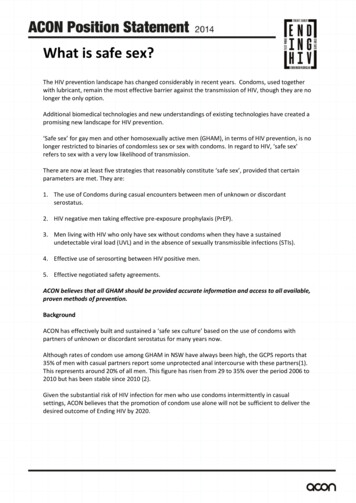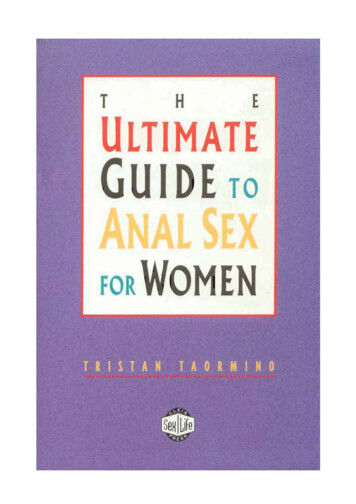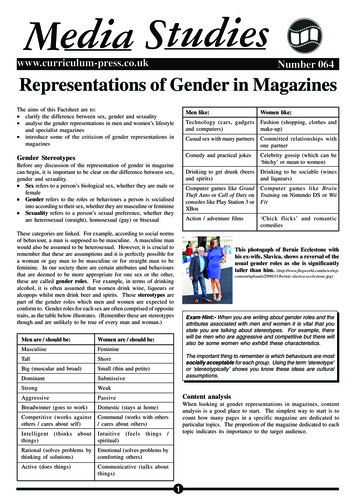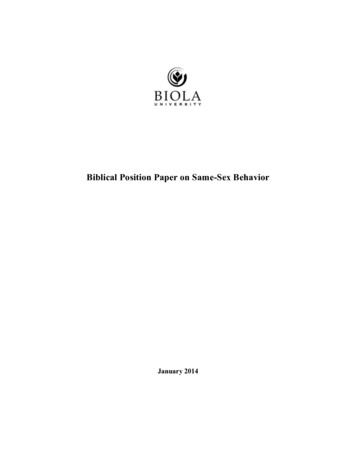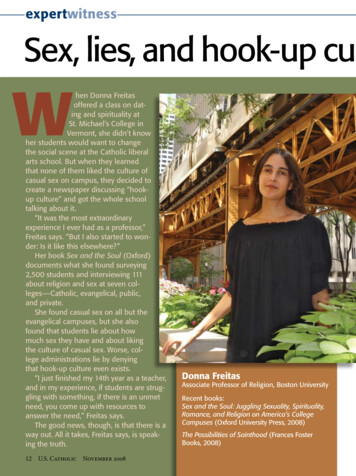
Transcription
expertwitnessSex, lies, and hook-up culWhen Donna Freitasoffered a class on dating and spirituality atSt. Michael’s College inVermont, she didn’t knowher students would want to changethe social scene at the Catholic liberalarts school. But when they learnedthat none of them liked the culture ofcasual sex on campus, they decided tocreate a newspaper discussing “hookup culture” and got the whole schooltalking about it.“It was the most extraordinaryexperience I ever had as a professor,”Freitas says. “But I also started to wonder: Is it like this elsewhere?”Her book Sex and the Soul (Oxford)documents what she found surveying2,500 students and interviewing 111about religion and sex at seven colleges—Catholic, evangelical, public,and private.She found casual sex on all but theevangelical campuses, but she alsofound that students lie about howmuch sex they have and about likingthe culture of casual sex. Worse, college administrations lie by denyingthat hook-up culture even exists.“I just finished my 14th year as a teacher,and in my experience, if students are struggling with something, if there is an unmetneed, you come up with resources toanswer the need,” Freitas says.The good news, though, is that there is away out. All it takes, Freitas says, is speaking the truth.12U.S. Catholic November 2008Donna FreitasAssociate Professor of Religion, Boston UniversityRecent books:Sex and the Soul: Juggling Sexuality, Spirituality,Romance, and Religion on America’s CollegeCampuses (Oxford University Press, 2008)The Possibilities of Sainthood (Frances FosterBooks, 2008)
ultureIt seems that easy sex is rampant on college campuses today,but new research reveals that students really want romance.The editors interview Donna FreitasWhat is a hook-up?I asked every single person in the study how they defined it,and I learned that a hook-up is any sexually intimate activity—it could be as innocent as kissing or it could be intercourse—but what defines it is that it’s casual, unplanned, withno commitment. It often involves alcohol and little talking.How prevalent is hooking up on Catholic campuses?The reality is that Catholic colleges are like secular colleges.Everywhere I’ve been, students say the same thing abouthook-up culture. The only exceptions are evangelical schools.The perception is that everybody hooks up all the timeand loves it, but in reality people are hooking up far less thanthey think others are. A lot of students had one hook-up experience, but that certainly is not rampant. People lie about howmuch sex they’re having and inflate what’s going on becausethe social pressure to hook up is really enormous.There are a few students who really do love hook-up culture. They are the kings and queens of the school—the purveyors of hook-up culture—especially on small campuses, butthey are very few and far between.Is hook-up culture new?I graduated from Georgetown in 1994, and I knew about hooking up. But it also meant, “Let’s hook up for happy hour.” Youknew who the hook-up crowd was, but it wasn’t pervasive.Now this Animal House, frat-boy behavior is the norm onmany campuses. You don’t have to join a frat to go to themeparties where men dress up as “pimps” and women dressas their “whores.” When I was in college, we had events like“preppy” parties, but now there are a number of variations on“pimps and ho’s,” almost all with men in powerful positionsand women dressing sexily in subordinate positions. Everywhere I go, students say that everybody goes to these parties.If most students don’t like hook-up culture, what do theywant from relationships?Almost everyone—regardless of gender or sexual orientation—told me they want old-fashioned romance.When romance came up, students said it’s talking—justtalking for hours, on a pretty beach, over dinner, under astarry sky. They want communication. With hook-up cultureany communication that happens tends to be sexual anddrunken. That’s not real or romantic to the students.It’s not that they don’t want to have sex ever or that they wantto save sex for marriage—so, parents, don’t get your hopes up.But when they have sex, they want to be in love with that person.They want respect. They want someone to know them. Theywant hundreds of candles lit. And they don’t want to get thereright away. They would like endless nights of romance first.Then there’s sadness and remorse that they have no ideahow to get what they want. They feel like it’s crazy to feel thisway, and they’re embarrassed to admit it.Basics like asking somebody out seem impossible to them.A few actually told me it’s much easier to have sex with someone than to ask him or her out.Students are left hoping that if you hook up with somebody often enough, maybe eventually they’ll realize theylike you, and you’ll get into a relationship. That’s why a lot ofwomen say they hook up.Is there a difference in the way young men and womenperceive hook-up culture?People think girls have become frat boys. Ariel Levy inFemale Chauvinist Pigs (Free Press) talks about how this is,again, about the difference between perception and reality.The myth today is that all women love sex and porn.But when Levy sat down with women alone, she heardthat they’re actually really unsettled by that attitude. They feelashamed and uncomfortable. That’s what I found as well.I taught a course on my study last year, and I had the mostleft-wing students you can imagine. Their favorite book wasA Return to Modesty (Free Press) by Wendy Shalit, who wrotethe book right out of college. She turned to Orthodox Judaismand its modesty laws as a way out of hook-up culture. She talksabout modesty being a virtue and about drawing boundaries.My students didn’t know they could have boundariesother than at sexual assault and rape. They felt they had to goalong with behavior that made them uncomfortable.The other piece is that, with a very few exceptions, guysdon’t like hook-up culture either. They don’t want to rack uptheir number of sexual partners. They feel it gets in the way ofNovember 2008uscatholic.org 13
expertwitnessreal relationships. But there is a stigmaamong guys about critiquing hookup culture. Expressing an interest inromance or dating is a mark againstthem, while hooking up is how theyprove their masculinity to other guys.They felt trapped as well.Why don’t students feel they canchange their own behavior?The issue is that hook-up culture rulesthe day. The social ethic is so powerfulthat students are afraid to say anythingagainst it.College students also feel that theyare more or less abandoned to dealwith sex on their own. The administration, residential life, and other adultsare afraid of scandal. They worry aboutadmissions and about parents findingout what is happening on campus.It’s hard to find official statistics thatto a campus and raise these issues whenthey are from another institution. Theycan take my book and the stories thatare in the book and evaluate all thesedifferent topics with a little bit of distance, without implicating their collegein the process. There is still a “we’re gladyou said it and we didn’t” attitudeI’m hoping the book—rather thansome campus incident or scandal—willspark conversations at colleges. Feardoesn’t do anything for students. It justperpetuates the gulf between what thecampus is preaching officially—as wellas what almost all students want—andwhat students are actually doing.What should parents do to respondto hook-up culture?There needs to be a precollege sextalk—and not just a sex talk but a relationship talk: Are you ready for this? Doyou know about hook-upculture? Do you want this incollege? Do you know howto ask somebody out?These conversationsaren’t happening in comprehensive sex educationor in abstinence education.Students seem to know allabout the mechanics ofsex and preventing diseases, but theyhave no idea how to talk to somebodythey’re attracted to about sex.Parents should also assess thesexual and relationship climates during the campus tour. That may soundstrange, but one of the biggest thingsstudents said could make or breaktheir college experience was sex andrelationships. Parents should evenask—maybe when their kid is not inthe room—if people date at the college.Hook-up culture rulesthe day. The social ethic isso powerful that studentsare afraid to sayanything against it.capture sexual behavior on campus. Itwould be like admitting guilt. On Catholic campuses, if the administration,the staff, or campus ministry sponsorsa program about sex, they’re admittingthat students have sex before marriage,which goes against Catholic teaching.How have people reacted to yourstudy?It’s an incredibly controversial topic,but it has been a pleasant surprise thatthere has been tons of interest fromdifferent colleges, including Catholicschools, and I’ve been invited to speakat a number of campuses.I get to be the messenger. It’s muchless scary for somebody else to come in14U.S. Catholic November 2008Where do young people’s sexualethics come from?That’s a good question. Unless they’reevangelical, it doesn’t come from theirfaith tradition as a rule.A lot of students have romanticideals from the movies or their parents. Many know how their parentsmet and fell in love in college. Thenthey had a rude awakening when theyrealized that it wasn’t going to happenthat way for them. They have somesense of what they’d like, but they’renervous to define anything specificbecause the rule is to be laid back andcasual about sex.Even if parents raise their kids withvalues, these standards seem to getsquelched in college.What about Catholic sexual values?I didn’t hear anybody say that they feltthe Catholic Church was right aboutsex. Nobody brought up Pope JohnPaul II’s theology of the body. I askedevery Catholic what the church teachesabout sex. Generally people laughed inmy face. I got sarcastic remarks: “Whatdo you mean? Nothing.” Or I got twothree-word answers: “Don’t do it,” and“Don’t be gay.”I asked Catholics what they learnedabout dating in church or CCD, andthey looked at me like I had threeheads. As a rule, Catholics don’t talkabout dating as part of faith formation.In general do young people think ofthe Catholic faith as irrelevant?In our interviews Catholics didn’t say alot about their faith. That says that theyfeel very alone in terms of being able totalk about religion in a personal way.They experience it as a very privatetopic—something that you don’t sharewith others.But in journals students wrotethousands of words. On paper they’revery expressive and they’re also veryangry. I wouldn’t say young Catholicsare apathetic. They feel alienated andignored. They have no idea how tobridge the disconnect between theirlives and what the Catholic Churchteaches. The teachings seem just totally
I asked every Catholic whatthe church teaches aboutsex. People laughed in my face.irrelevant tothem. They don’tknow what theCatholic Churchteaches aboutanything aside from volunteering andsocial justice.Are Catholics part of the group thatidentifies as “spiritual”?About 80 percent of the students,including the Catholic students, identified as “spiritual.” Some also identifyas “religious,” but most often they saythey are “spiritual but not religious.”People moan and groan about this,but there’s a more productive way oftalking about it: Students are feelingalienated and lonely within the religions they were raised in, but they’renot quite ready to let it go altogether.They latch on to the word spiritualbecause they feel like there’s moreroom to grow, and it’s from that wordthat they’re somehow trying to digthemselves out of hook-up culture, too.I received more responses than Icould handle in this study. Many students participated not because theyknew what spirituality had to do withtheir dating or sex lives, but becausethey wanted to know.The fact that they don’t like hookup culture and are hanging on tospirituality is a sign that there’s a reallyhopeful place to go with this conversation. There’s a way to maybe even makethem feel less alienated from their religious tradition if we help them begin toanchor the longing that they feel.But you have to let them be in thatplace. You can’t just get angry at themfor it, which I see a lot of people doing.How can you make Catholic teach-ings on sex more relevant?I’d turn that question around: Howwould college students make theseteachings successful? How would theyframe the conversation?Students in my class at St. Michael’sCollege came to me and asked if theycould put out a newspaper on hook-upculture. All of it wasn’t exactly what thechurch would want to hear, but it wasimpressive that students decided to dothis.If we don’t give students resources,how are they going to figure this out?That’s what the evangelicals do, andyoung evangelicals do figure it out—atleast as best as they can.How do evangelicals and Catholicshandle this issue differently?If you want to study sex and religionwithin Christianity, the real place to doit is among evangelicals. The Catholicconversation is almost nonexistent.There are orthodox young Catholicswho toe the party line, but they are theexception to the rule. They are the oneswho fit in with church teaching.But even orthodox Catholicsaren’t like evangelical youth. To beyoung and evangelical is really to beimmersed and participating in or creating a youth culture. They are youngtheologians of a sort. They are interpreting scripture, writing books ondating, overseeing their own faith lives,and holding their peers accountable.Joshua Harris wrote I Kissed Dating Goodbye (Multnomah Books)at age 21. When students look at hispicture on the back cover, they thinkhe looks like a cute, cool guy. So I askthem if they’d be more apt to listen ifsomeone like him were asking themto practice chastity. Then I ask students who the young adult Catholicstalking about dating are, and theycan’t think of one person.A syllabus for datingIn addition to her own book, Sex and The Soul (Oxford), hereis a selection of the books and articles on sexuality, dating,and spirituality that Donna Freitas has her students read:“Sex and the University”by Julia Tier at ex and Scandal at Duke” by JanetReitman (Rolling Stone, June 2006)Just Love by Margaret Farley(Continuum International, 2006)A Return toModesty by WendyShalit (Free Press,2000)I Kissed DatingGoodbyeby Joshua Harris(Multnomah Books,2003)Sex God by Rob Bell (Zondervan, 2008)Every Young Man’s Battle: Strategies for Victory in the Real Worldof Sexual Temptation by StephenArterburn and FredStoeker (Waterbrook,2002)Every Young Woman’s Battle: GuardingYour Mind, Heart,and Body in a SexSaturated World byStephen Arterburn and ShannonEthridge (Waterbrook, 2004)Righteous: Dispatches from theEvangelical Youth Movement byLauren Sandler (Viking, 2006)November 2008uscatholic.org 15
expertwitnessEven if you don’t like what evangelicals are saying, there is quite a lotout there to learn from.Can a vibrant youth-created culturebe built in the Catholic Church?When I ask students why they don’twrite their own version of I Kissed Dating Goodbye, they respond, we can’t;we’re not allowed; we’ll get excommunicated; you’re not allowed to do thatunless you’re a bishop or a cardinal.The intensity of the disempowerment to speak about faith—this is reallythe difference between Catholics andProtestants. We talk about how theCatholic Church is the people and notjust the hierarchy. But when it comesdown to it, most Catholics believe theopposite, and it silences them.If young people felt they could writetheir own books on dating, they actually might be able to change hook-upculture. The pope isn’t going to comeout with an encyclical on dating, eventhough I jokingly keep calling for one.Regardless, they don’t find it credible when someone who is celibate and,in their minds, old tries to speak tothem about these matters. They do findeach other credible, however.Why aren’t we thinking aboutCatholic colleges as places where,regardless of students’ faith, we essentially are trying to create theologiansin-training—people who can reflectdeeply and critically on faith and speakauthoritatively about it?How do you get the conversationstarted?I think the most unproductive thingabout Catholic sexual teaching is thatit’s presented as just a prohibition—“nopremarital sex”—with no sense of whythe church teaches this. When it’s presented this way, the conversation ends,as does students’ thinking about it.But when you look at how theCatholic Church teaches that people16U.S. Catholic November 2008should be treated, there’s more roomfor discussion. What does it mean to bemade in the image of God? What doesthat mean for how you treat others?What they learn in their social justice classes is really relevant to addressing hook-up culture. We have to backup from “no premarital sex” and builda foundation before moving to whatthis means for their lives. They need tosee that this is a framework in whichthey can live, move, and discern.hook-up culture exists there?Such a program would address topics like hook-up culture and humandignity and look at the mission statement. Students would ask, “What doI want out of college personally withregard to my social life, with regard towho I am and who I’ve become? Whatare my values?”Students are hungry to talk aboutthese things. That’s why courses ondating fill up really quickly.Are you saying we should set sexualUntil such programs start, what canethics aside to address this issue?The most helpful thing the churchhas to say about sex is about humandignity and respect and mercy. That’swhat’s absent on campus.We should be asking, “Where is thedignity on campus Friday night? Doyou have dignity at a party on Fridaynight?” That’s a really powerful question to students, and it is sexual ethics.If you were an administrator at aCatholic college what would you doabout hook-up culture?I would add a first-year seminar program on community. A lot of peoplelove to talk about community andjustice and human dignity as if it’s faraway. You do community service offcampus. But reflecting on your owncommunity and its values is muchscarier. What if your communitydoesn’t look so nice—if it’s messy orbe done to fight hook-up culture?All we need to do is tell students thatmost of them don’t like hook-up culture.In all my classes now, I tell mystudents, “Guess what? The vast majority of you think that everybody loveshook-up culture, but the reality is thatthe vast majority of you hate it. Andyou would rather just ask each otherout and have lovely dinners and walkson the beach. You all feel the same way,so why don’t you just ask each otherout?”I do think that there is a simpleshift to be made, but in order to makeit, colleges have to be willing to admitthat hook-up culture exists. And that’sthe sticking point. USConthewebFor more from Donna Freitas ontheme parties and evangelical datingculture, visit uscatholic.org.
Books, 2008) expertwitness 12 U.S. Catholic November 2008 Sex, lies, and hook-up culture hen Donna Freitas . The other piece is that, with a very few exceptions, guys don’t like hook-up culture either. . romance or dating
